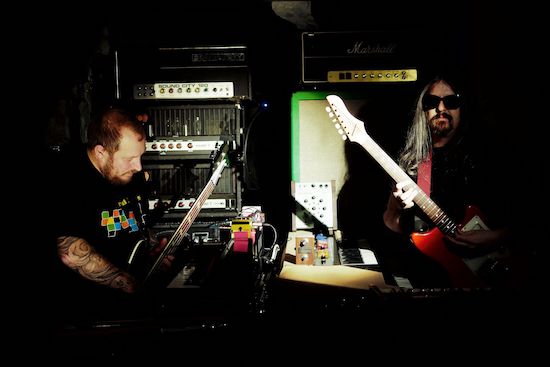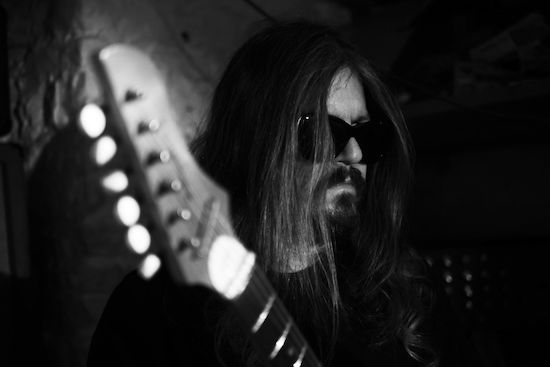You can tell a lot about a person from their favourite Black Sabbath album. Paranoid may be pretty unbeatable but, because of its hit-single title track, this tends to be the LP owned by those who have only ever purchased one Black Sabbath studio effort and it is thus, as a fave, treated with suspicion among connoisseurs. Opening with Tony Iommi’s weed-induced coughing fit and introducing the guitarist’s down-tuned technique for the inaugural time, Master Of Reality is the choice of many a herb-addled doomhead so stoned they don’t even mind that it sounds like it was recorded in a cobweb-ridden outdoor privy. Sabbath Bloody Sabbath suggests you have a penchant for awkward synthesizer accompaniments including those deriving from the nimble fingers of Rick Wakeman. Anyone who selects a post-Ozzy album – and can articulately offer a plausible take on exactly why they would want to do such a thing – is worth hearing out.
Paul Allen first came to cult recognition as a member of the Bristol-based space-garage crew The Heads. Anthroprophh began as a solo project, then soon became a scorching power trio when Allen incorporated the talents of Gareth Turner and Jesse Webb (who also play noise rock in The Big Naturals). Allen’s preferred Black Sabbath album is 1975’s Sabotage. He is in good company. This is also the favourite of Luke Haines, J Mascis, Julian Cope and other maverick creative types.
"It was the most surprising of all the Sabbath LPs when I first heard it," remembers Allen. "My mate Barry used to play the tape a lot when I visited his place. It was the early 90s and most of my friends were on the dole and used to smoke when we could and lived off TVP mince. With my senses heightened, it was the most entertaining of their records. It would be riffing away and then you would be sucked down the plughole into some acoustic or stern choral music. The cover, also, is beyond belief."
Capturing Sabbath on the cusp of rapid decline, Sabotage has historically been viewed as flawed, unfocussed, erratic, too loose and a little scrappy around the edges. These are also criticisms which might be made of Allen’s own discography, conceivably by close-minded philistines who prefer Arcade Fire and get all weepy when sipping red wine from a plastic cup while watching The National perform at Green Man Festival. As Leonard Cohen taught us aficionados of esoterica, the cracks are where the light gets in and as far as Allen’s music is concerned, the light is all kaleidoscopically coloured and smells like a smouldering space capsule that’s crash-landed on the surface of Jupiter after fleeing a dead Earth. [Jupiter is a gas giant and has no ‘surface’ that a space capsule could possibly land on but I fear that the substitution of a more mundane planet like Mars or Pluto would not convey the gravity of what you mean so have left your strange olfactory space travel metaphor in place. Although it should be said that while entirely gaseous – on journeying into Jupiter, after passing through a cloud layer of hydrogen/helium about 10% of the way in the gas becomes so dense that the hydrogen becomes ionised, turning into a metallic gas which approaches the density of water, which eventually, on travelling inwards further, condenses into something that a capsule could land on – despite being still technically a gas. According to a report in yesterday’s Guardian, "In the deep interior, where pressures are about 10 million times higher than at the Earth’s surface, scientists think the gas exists as a dense soup speckled with rocks of heavy metal… There may be a small hard [solid] core very, very deep, but we’re thinking it’s just dense gas enriched in heavy elements … it’s not a solid that you can imagine… The normal concept of gas, liquid and solid don’t really hold at these pressures.” Space Ed]
Like Sabotage, Allen does not lack endorsements from those willing to champion him as an unfairly maligned sonic gemstone.
Lurking behind a microphone at the crossroads where Dave Allen meets impenetrable free jazz, Stewart Lee is best known for his repetitive sanity-testing comic monologues. It is less widely recognised that for many moons he had a sideline in writing about music for the Giles Coren-promoting establishment newspaper The Times. In its pages, Lee waxed lyrical about everyone from Derek Bailey to Darren Hayman, presumably to the general bafflement of a readership who cannot for the life of them fathom why we, the people, wept at Bowie’s passing. Reviewing Anthroprophh’s self-titled debut in 2013, Lee said The Heads would have been celebrated as "living legends" if only they had been Finnish or Japanese. "Instead," he wrote, "they’re from Bristol, and remain prophets without honour."
Paul Allen concedes that this Bristolian heritage may have acted as some kind of commercial or critical hindrance. "In the past," he says, "The Heads might have been as the space-rock Wurzels. I am not too sure how Bristol is perceived now but there seems to be more choice with promoters such as Cacophonous Sarcophagus championing the more experimental side of things. I think in this country we find Japanese underground rock music more exciting than our UK stuff for some reason. I know Japanese underground rock bands experience indifference in their own country because my mate went to a Boris show in Tokyo and it was poorly attended. Local bands sometimes experience that kind of indifference, I guess. Heads records are a lot cheaper in Bristol than they are elsewhere."
When that first Anthroprophh album came out, Allen spoke of the strong Germanic influence on his project; this world of sound having been originally revealed to him via the publication of Julian Cope’s Krautrocksampler book in the mid-90s. On Omegaville, Anthroprophh’s new double album, you might also detect a Japanese psych- and noise-rock vibe. Certain bits of it evoke Acid Mothers Temple, Melt-Banana, Keiji Haino, and their ilk.
Allen recalls discovering bands such as AMT in the early noughties and this having an impact on specific sections of The Heads’ Under Sided LP from 2002. "Maybe now it’s just an echo of that initial influence with some other references too. Sometimes when you create these things, you think, ‘Let’s just freak out a bit’ and don’t think of the reference points. I like Cope’s Japrocksampler too but it didn’t blow my mind like the previous sampler book. Maybe that’s because I was older and kind of aware of those bands, and also because the German scene seemed more unique and less derivative. I felt that the Japanese rock from that time was a little clinical in places and less surprising. The Les Rallizes Dénudés LPs are great though, even if they do all sound very similar. People’s Ceremony~Buddha Meet Rock LP was a strange mix of styles too."

The krautrock influence extends to Omegaville‘s sequencing. This was arranged, in part, as a homage to Can’s Tago Mago, with its relatively accessible tracks at the start leading up to the most strung-out, abstract and experimental pieces. Omegaville‘s early tunes include ‘Dead Inside’ which, at two and half minutes long, resembles The Stooges demolishing MC5’s dressing room with Lemmy-era Hawkwind turned up to 11 on a dusty tape deck . It feels spiritually kindred to Ethan Miller’s work with Comets On Fire and, more recently, in Feral Ohms. This track is followed by a franticly irate number called ‘Housing Act 1980’ which refers to government "Right To Buy" schemes both past and present. "I never meant to come up with something overtly political, as it could be seen as a bit po-faced," says Allen. "But from a personal perspective it’s something that keeps cropping up. As with many other cities, Bristol is becoming an increasingly expensive city in which to live, with its high rents, whilst central London becomes a rich man’s ghetto."
The double album concludes with two tracks, 15 and 21 minutes in length, which reflect the psychological, cultural and communal chaos and misery towards which we, as a society, appear to be heading. Talking about Omegaville‘s overriding concept, Allen explains that "It starts off with general first-world problems – ‘Sod’, for example, is vaguely about how crap it can be to be in a band – but then it descends into being about the gentrification of my hometown and the possible outcome for the not-so-wealthy. The sounds at the end of the record are supposed to be from an imagined out-of-town hellish reservation where an overwhelming number of us end up homeless and insane. It’s not a happy ending but not an improbable scenario for people in my situation and for many of my friends and their offspring too. That’s if we continue with our current trajectory, with housing especially."
From ear-blistering blasts of garage psych to pessimistic 20-minute space-kraut epics in the vein of Gnod, Allen’s music might be right up Stewart Lee’s street but it is not everybody. Back in the day, there was an infamous review printed in the now-defunct Vox magazine which gave The Heads’ debut album (1995’s Relaxing With…) an unwarranted rating of zero out of ten. More recently, Drowned In Sound scored the first Anthroprophh record a similarly stinging two out of ten. Seeing as his bands never attract bucketloads of press, Allen does tend to read most of the reviews that do appear: "I find the bad ones kind of funny, in a masochistic way. I always remembered the line in an episode of The Thick Of It, where one politician is asked about doing a Google search of his own name. He replies, ‘Why would I do that? It’s like opening a door to a thousand people telling me how shit I am.’ My favourite live review was one where they called the gig a ‘sub-Hendrix wank’."
Speaking of Jimi, do you remember that juicy Quincy Jones interview that went viral last month? The one where he criticised Ringo’s drumming, revealed that Brando and Pryor were more than good friends, claimed to know the true identity of Jack The Ripper, and shook his sorry head at the very thought of U2. There’s a bit in that Q&A when Jones claims that Paul Allen, the multibillionaire co-founder of Microsoft, can play guitar "just like Hendrix". Perhaps Jones, who is in his mid-80s, got confused. Maybe he heard the other Paul Allen, the guy from The Heads and Anthroprophh, letting rip across his electrified fingerboard with amplified abandon. Jones asked who on Earth could be making such a bodacious racket. "Paul Allen," someone replied. And Jones just assumed they’d meant the rich computer dude.
It is odd, points out Paul Allen, the guitarist and vocalist of Anthroprophh and The Heads, that the Paul Allen of Microsoft fame once played in a band called The Threads. With that slightly spooky coincidence hanging in the air, we end with two questions shamelessly lifted from an interview with the Microsoft Allen, in order to get the Anthroprophh Allen’s alternative perspective.
What do you think the biggest technological innovation in the next ten years will be?
"The Microsoft Euthanasia Pod. Available on any high street."
You’ve done many amazing things in your life. What do you want your legacy to be?
"It doesn’t matter. We will all be forgotten soon. As long as we enjoyed ourselves and didn’t cause too much harm… Who cares?"
When answering that final question, the Microsoft Allen trotted out some entrepreneurial and philanthropic platitudes about being continuously excited about a broad range of "new ideas" and with "creating things".
You can tell a lot about a person from their favourite Paul Allen.
Omegaville is out now. Anthroprophh play at the Garage on Sunday March 11 as part of the Rocket 20 weekender


